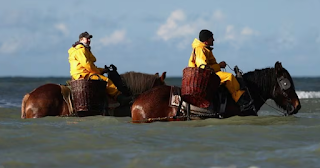Climate Change Hits Home for Belgium's Historic Horseback Fishers
In the quaint coastal village of Oostduinkerke, Belgium, a centuries-old tradition of horseback shrimp fishing, recognized by UNESCO, faces the stark realities of climate change. As horseback fishers like Gunther Vanbleu navigate the waves, the impact of global warming on the North Sea ecosystem becomes evident.
In this unique practice, Gunther's draft horse, with powerful hindquarters, pulls a chain along the sandy beach, causing vibrations that prompt shrimp to jump into an awaiting net. Yet, the changing climate has disrupted this age-old rhythm. Vanbleu notes, "We have less shrimp catch than we used to. But we also have more weevers and animal species that you didn't see here before, which come from the Atlantic as the water warms up."
The horseback fishers, the last practitioners of this historic method, find themselves on the frontline of climate change impacts. Oceans, absorbing 90% of global warming, have elevated North Sea surface temperatures by approximately 0.3 degrees Celsius per decade since 1991.
Eddy D'Hulster, another fisherman, reflects on the altered seasons, "The season finished when we saw the first snow; in December, it finished. Now, we don't see snow." The traditional cues for their fishing season have become uncertain as climate change disrupts long-standing patterns.
Marine ecology researcher Ilias Semmouri of Ghent University sheds light on the shifting marine dynamics, stating, "For some species we see higher abundances, for example, the weevers and the squid, like cuttlefish, amid warmer water temperatures."
However, not all species thrive in the changing conditions. North Sea cod populations have sharply declined since the 1980s, attributed to rising sea temperatures and overfishing. Hans Polet, science director of ILVO, the Belgian fisheries research institute, expresses concern about the unpredictable changes in fish stocks, making sustainable management challenging. "Nature does not respond anymore as we are used to. The turbulence is coming in the system," he warns. "Where is it heading? I don't know. I'm worried, I'm really worried."
In the midst of serene coastal traditions, Belgium's horseback fishers grapple with the tangible impacts of climate change, highlighting the urgent need for collective environmental stewardship.
#BelgiumFishingTradition, #ClimateChangeImpact, #NorthSeaEcosystem, #TraditionalFishing, #ClimateWitnesses

